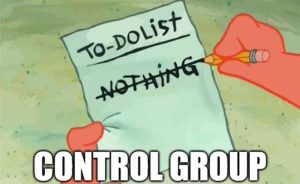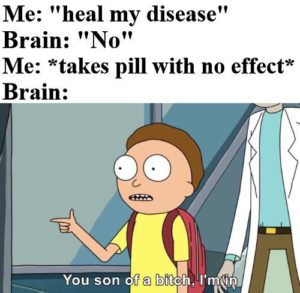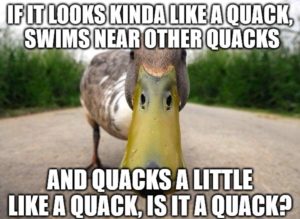There is no shortage online of people selling quackery, be it selling colloidal silver to cure cancer and AIDS or claims that chiropractic “adjustment” will fix asthma and autism. Basically, a quack is a health fraud, a pseudoscientific snake oil salesman, that sort of thing. For centuries, people have fallen sway to scam artists and true-believer quacks alike, and it’s unlikely we’ll get rid of these scourges any time soon.
Sometimes, though, you encounter claims about a particular treatment or method that is alleged to have some benefits and it may not be clear at first glance if this is something that might be real or if it’s just more quackery? On that note, I recently enjoyed this Myles Power video on the “guru” Wim Hof.
Wim Hof, a.k.a. “The Iceman”, is an extreme athlete and motivational speaker who can regularly withstand exposure to very low temperatures (e.g., immersed in near-freezing water or an ice bath) for extended periods of time.

He attributes this ability partially to a combination of breathing technique, cold water exposure, and willpower (or something like meditation and commitment). Together, he sells this “Wim Hof Method” (WHM) in the form of books, merchandise, for-profit online classes costing hundreds of dollars, in-person classes with instructors who paid thousands to be certified in his system, or workshops and weeklong expeditions costing thousands.

Books and documentaries describe his exploits and his method, and they — or Hof himself in talks and interviews — sometimes claim that the WHM can help with various diseases like Parkinson’s or multiple sclerosis, even though there’s no evidence of this. Harriet Hall, a medical doctor at Science Based Medicine has investigated some of these claims if you’re curious.
Anyway, back to the Myles Power video: Power, a great debunker of quack gurus and snake oil salesmen, gives an overall sympathetic treatment to this particular guru. Power doesn’t frame Wim as a full-on quack the way many other gurus who make overblown or fraudulent medical and scientific claims can be. Rather, Hof is framed as someone over-excited about his methods who puts forth a lot of speculation as if it’s factual (not great!), but who, in general, seems open to scientific testing of those claims.
Yes, he and his followers regularly make claims that go far beyond anything we’ve got evidence for, but he’s also excited to work with scientists to see if those claims hold up. And this is important because people have been known to die from trying his method (usually passing out when hyperventilating, especially before submerging in water).
Now, many of the abilities Wim claims come from his method aren’t actually from his method but more likely just the genetics he was born with. His twin brother (same genes) has similar brown fat levels and similar tolerance for extreme temperatures despite a sedentary lifestyle and no regular cold exposure. Wim Hof may accomplish his feats and break cold-exposure records not because of his ‘method’ but at least partly because of his particular genes.
Furthermore, Power’s YouTube video has good examples of how the ‘feats’ they show in a documentary don’t necessarily match what actually happened (like the climb of Kilimanjaro — behind the scenes the details look very different, and they didn’t even reach the summit).
Even better, Power’s video has some good examples of how poorly done research can make it seem like science has supported a method or theory when in fact it doesn’t provide very strong evidence for that thing. For example, for a very small number of people in a “proof-of-concept” study, doing Wim Hof’s breathing technique before receiving a mild toxin injection led to a different immune response (note: not necessarily a better one, just different!) compared to not doing the breathing technique. However, the researchers didn’t compare to a proper placebo group (i.e. some other equally compelling-sounding or believable ‘treatment’ that didn’t involve the breathing technique) so, yes, there was a half-assed “control group”, but not one that gives us very much confidence in the effect.

What do I mean? Well, think about the gold-standard research design to test whether a new medication works for some condition: a randomized clinical trial (RCT). Take a whole bunch of people, randomize them into two groups that start off basically the same in all ways (thanks to that randomizing averaging everything out), and then give one group the pill with the drug you’re testing and give the other group a fake pill with no drug at all in it (a placebo pill). No one knows who’s in which group, so both group have similar expectations and both get treated the same by doctors/researchers; the only difference is that one group got the actual medication.
If the drug group shows a much bigger effect than the placebo group, then the drug likely works; but if the drug group and the placebo group both show a beneficial effect and there’s no difference between them, then the drug isn’t any better than an empty pill (the drug itself doesn’t do anything) and it’s probably not a promising medication.
Yes, the drug group might’ve improved relative to doing nothing at all, but if an empty pill (or spinning in a circle and clucking like a chicken, or praying to Thor, or anything else) helps just as much, then the drug itself is unnecessary. In cases like that, we’re observing the placebo effect or other non-specific effect (meaning any benefit isn’t specific to the treatment you’re testing).
Placebo effects can happen for any putative treatment; no pills need be involved. To rule out non-specific effects like the placebo effect, clever research design is needed. Ideally that would be an active control group, i.e. one that has similar beliefs+expectations [PDF] about what’s happening to them as those in the experimental group.
Perhaps, for example, you have the control group do an equal amount of some other breathing technique and exposure to hot water instead of cold water, but you tell them in an equally-convincing way that this is some fancy and amazing method with healing power. (Note: you also have to actually check that they’re similarly convinced as those in the Wim Hof Method group — that’s called a manipulation check).

Why is this such a worry? Well, after the initial publication of those results where some people were given WHM training and then had a different immune response to a toxin, follow-up research (again with a small sample, unfortunately) showed that outcome expectancy likely played a big role in those original results (as they do for other conditions where the immune system is involved). Basically, those who felt optimistic about the treatment had more of a response.
In the case of Wim Hof’s method, we don’t have particularly strong evidence at this point that his method is anything more than placebo (and in his own case, a boost from genetics). That said, it’s at least plausible that one could, say, cause a small, temporary change in immune response by hyperventilating. Why? Because that’s an already-known process (hyperventilating increases excretion of CO2 and reduces the body’s immune response — not that these are always good things!). Whether that or any other element of Hof’s method has any real-world benefit or can affect actual diseases like Parkinson’s or M.S.? That is a whole other question, and we certainly have zero reason to believe that’s true.
The method certainly seems unlikely to do all the wild things he and his followers claim, yet Hof makes for quite the confident and enthusiastic salesperson (and some of his certified trainers and followers make even more absurd claims without evidence). Hof himself often mixes real-sounding medical information with nonsense and unsupported claims in a way that sounds quite convincing.
Whether those claims are true is something we only find out with careful scientific testing (i.e. evidence-based medicine), and it’s to Hof’s credit that he does seem interested in participating in this process with actual scientists. Yet Hof continues to peddle or happily associate with pseudoscience (like the total nonsense practice of “earthing“) and people exaggerating about how the WHM might lead to cancer cures.
Like Myles Power, I wouldn’t go so far as to call Hof a full-on quack, but he does end up spending more time than I’d like submerged in and around Quack Lake.

********
On a related note:
Pepijn van Erp shares this exchange from an interview with Hof on the television station Limburg 1 (L1):
L1: ‘Are you convinced that someone with cancer can cure himself with these methods?’
Hof: ‘No, absolutely not, I would not go that far. What this is about … we have shown now, as the first group in the world, that the autonomic nervous system, of which science up to now was telling that you aren’t able to influence it, we can influence this in relation to the immune system. This means that every human from this moment on, can influence his autonomic nervous system in relation to his immune system and can learn to do this in really short time.
L1: ‘But Ockels thought …’ [PvE: Wubbo Ockels, the first Dutch astronaut, died of cancer just two days before the interview. He had shown much interest in the Wim Hof Method as one of the many alternative methods he tried out to beat the terminal cancer he was suffering from]
Hof: ‘This is what we have achieved at this moment. And science is above speculation, it is not philosophizing.’
L1: ‘I just asked you: can you cure cancer with these methods?’
Hof: ‘I believe that every disease, any disease whatsoever, is essentially a disbalance of the immune system and that this immune system …’
L1: ‘But do you claim that even cancer can be beaten with these methods?’
Hof: ‘Yeah, but proper research is necessary for this.’
L1: ‘OK that’s clear, it has not yet been proven, but you think it is possible?’
Hof: ‘I think absolutely that there, uh .. 95 percent of all diseases, amongst which are numerous types of cancers, can be cured.’
Leave a Reply